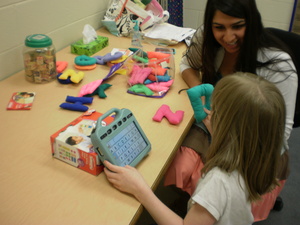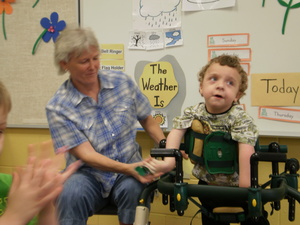Assistive Technology Center
To learn more about the AT Center or for the AAC Lending Library, visit AT4Kids.
The Assistive Technology Program is funded by the Tennessee Department of Education and the following participating school systems: Alcoa City, Athens City, Lenoir City, Loudon County, McMinn County, Meigs County, Monroe County and Sweetwater City. Their supervisors of special education oversee the center's activities as members of the AT Center Advisory Board. The center’s AT certified staff provide specialized evaluation of students who may benefit from assistive technology or augmentative education, assistance in the acquisition of appropriate technology, training and mentoring of students, families, and educators in the use of the technology.
Assistive technology (AT) makes it possible for individuals with disabilities to take part in life’s activities, at home, school, work, and in the community. It strengthens developmental, functional, and learning skills. It can substitute for abilities that a person may not be able to develop. For instance, a person may not have use of her voice, but AT can allow her to communicate her thoughts, wants, and needs. No one is too young or too old to benefit from AT.
Infants, toddlers, children, and young adults may use assistive technology to help them move, communicate, learn, work, and socialize. In most cases, the AT devices that a person uses will change over time, as s/he grows and develops physically, intellectually, and emotionally. This is particularly the case with young children and youth. AT appropriate for a 3-year old will rarely be suitable for a 7-year old or a 12-year old. It’s important, therefore, to regularly evaluate a child’s needs and experiences with his or her devices, services, and accommodations.
Assistive Technology 101 PDF (Source: Center on Technology and Disability)
What is Assistive Technology (AT)?
Assistive technology (AT) is any item, equipment, device, software, or service that is used to enhance, maintain, or improve the functional capabilities of individuals with disabilities. Put more simply, AT is anything that makes it easier for a person with a disability to fully participate in school, work, and society.
AT in Education
At LTVEC, we specialize in the use of AT for education. This means anything that can help a student read, write, calculate, communicate, see, hear, move, and play. We provide curricular software, electronic devices, adapted toys, educational software for learning disabilities, pencil holders, eye-gaze, and head trackers. With the support of the appropriate assistive technology, the student has ability to master the general education curriculum content, organize themselves, and modify behavior.
Assistive Technology Continuum
Is AT full of specialized, cutting-edge technology? It can be! But it also includes the technology that you probably use every single day and even something as simple as some Velcro. Assistive technology provides a spectrum of solutions from sophisticated, high-tech devices to low or even no-tech solutions.
High Tech devices incorporate sophisticated electronics or computers.
Medium Tech devices are relatively complicated mechanical devices, such as wheelchairs.
Low Tech items are less sophisticated and can include devices such as adapted spoon handles, non-tipping drinking cups, and Velcro fasteners.
No Tech solutions are those that make use of procedures, services, and existing conditions in the environment that do not involve the use of devices or equipment. These might include services such as physical therapy, occupational therapy, or the services of other specialists. (NATRI, 2006).
Lending Library
A wide range of assistive technology devices are available to check out and trial from our lending library. You can view available items at AT4Kids.
IEPs
When developing an Individual Education Plan (IEP) for a student, IDEA (Individuals with Disabilities Education Act) requires IEP teams to “thoughtfully consider” whether a student needs assistive technology devices or services regardless of the type or severity of the disability.
















The AT Center also hosts a great resource blog with free resources and supports for Assistive Technology. Check us out at www.at4kids.com.
Contact the AT Center:
Janice Reese
Phone: (865) 458-8900
Email: at.center@ltvec.org

